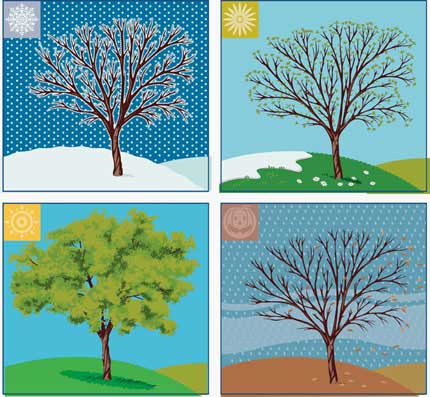 |
| IMG: Source |
Words for the seasons and related terms often have both literal and figurative connotations. Here are the words and their various senses.
Spring (from the Old English word springan, akin to the same word in Old High German, which means “to jump”) has a sense of freshness and growth. The word is sometimes used to refer to a sociopolitical movement for greater freedom and tolerance, as in phrases like “Prague Spring” and, more recently, “Arab Spring.”
Spring itself, in these senses, has no direct adjectival form besides springlike; springy refers to the word’s sense of movement. However, vernal (from the Latin word ver, meaning “spring”) is suitable for references to anything pertaining to the spring, or anything fresh, new, or youthful. In a practical sense, it often refers to phenomena unique to springtime, such as a vernal pool, a body of water that dries up as summer encroaches on spring.
Summer (from the Old English word somer) has associations with thriving and mature growth, and it is also a poetic synonym for years in references to one’s age (for example, “in my tenth summer,” “a boy of fifteen summers”). Summery is a prosaic descriptor term describing qualities associated with summer. Estival (from Latin aestivus, meaning “of summer”) also means “pertaining to summer”; estivation is the summertime equivalent of hibernation, or sojourning at one location all summer.
Autumn (ultimately from the Latin word autumnus), interchangeable in literal meaning with fall, has a figurative sense pertaining to full maturity or the onset of decline, as does the adjective autumnal. Winter has associations with decay and inactivity, and wintry, besides its literal sense, refers to being weathered as a result of winter weather or as if by such conditions, or to being aged; it also suggests a cold attitude or response.
Solstice (ultimately from the Latin word solstitium, meaning, literally “sun standing”) and equinox (from the Latin term aequinoctium, a combination of the terms for “equal” and “night”) refer to the times of the year when, respectively, daylight is shortest and day and night are of equal length.
The adjective equinoctial (or equinoctal) refers literally to the first day of spring and fall and has no established figurative meaning. (The first variant is also used as a noun synonymous with equator or referring to a storm during the equinoctial period.) There is no adjectival form of solstice, which corresponds to the onset of summer and winter.
Spring (from the Old English word springan, akin to the same word in Old High German, which means “to jump”) has a sense of freshness and growth. The word is sometimes used to refer to a sociopolitical movement for greater freedom and tolerance, as in phrases like “Prague Spring” and, more recently, “Arab Spring.”
Spring itself, in these senses, has no direct adjectival form besides springlike; springy refers to the word’s sense of movement. However, vernal (from the Latin word ver, meaning “spring”) is suitable for references to anything pertaining to the spring, or anything fresh, new, or youthful. In a practical sense, it often refers to phenomena unique to springtime, such as a vernal pool, a body of water that dries up as summer encroaches on spring.
Summer (from the Old English word somer) has associations with thriving and mature growth, and it is also a poetic synonym for years in references to one’s age (for example, “in my tenth summer,” “a boy of fifteen summers”). Summery is a prosaic descriptor term describing qualities associated with summer. Estival (from Latin aestivus, meaning “of summer”) also means “pertaining to summer”; estivation is the summertime equivalent of hibernation, or sojourning at one location all summer.
Autumn (ultimately from the Latin word autumnus), interchangeable in literal meaning with fall, has a figurative sense pertaining to full maturity or the onset of decline, as does the adjective autumnal. Winter has associations with decay and inactivity, and wintry, besides its literal sense, refers to being weathered as a result of winter weather or as if by such conditions, or to being aged; it also suggests a cold attitude or response.
Solstice (ultimately from the Latin word solstitium, meaning, literally “sun standing”) and equinox (from the Latin term aequinoctium, a combination of the terms for “equal” and “night”) refer to the times of the year when, respectively, daylight is shortest and day and night are of equal length.
The adjective equinoctial (or equinoctal) refers literally to the first day of spring and fall and has no established figurative meaning. (The first variant is also used as a noun synonymous with equator or referring to a storm during the equinoctial period.) There is no adjectival form of solstice, which corresponds to the onset of summer and winter.














